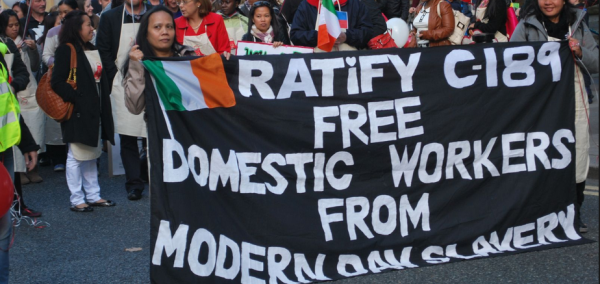
Mindful of the commitment of the International Labour Organization to promote decent work for all through the achievement of the goals of the ILO Declaration on Fundamental Principles and Rights at Work and the ILO Declaration on Social Justice for a Fair Globalization, and Recognizing the significant contribution of domestic workers to the global economy, which includes increasing paid job opportunities for women and men workers with family responsibilities, greater scope for caring for ageing populations, children and persons with a disability, and substantial income transfers within and between countries, and Considering that domestic work continues to be undervalued and invisible and is mainly carried out by women and girls, many of whom are migrants or members of disadvantaged communities and who are particularly vulnerable to discrimination in respect of conditions of employment and of work, and to other abuses of human rights, and Considering also that in developing countries with historically scarce opportunities for formal employment, domestic workers constitute a significant proportion of the national workforce and remain among the most marginalized, and Recalling that international labour Conventions and Recommendations apply to all workers, including domestic workers, unless otherwise provided, and Noting the particular relevance for domestic workers of the Migration for Employment Convention (Revised), 1949 (No. 97), the Migrant Workers (Supplementary Provisions) Convention, 1975 (No. 143), the Workers with Family Responsibilities Convention, 1981 (No. 156), the Private Employment Agencies Convention, 1997 (No. 181), and the Employment Relationship Recommendation, 2006 (No. 198), as well as of the ILO Multilateral Framework on Labour Migration: Non-binding principles and guidelines for a rights-based approach to labour migration (2006), and Recognizing the special conditions under which domestic work is carried out that make it desirable to supplement the general standards with standards specific to domestic workers so as to enable them to enjoy their rights fully, and Recalling other relevant international instruments such as the Universal Declaration of Human Rights, the International Covenant on Civil and Political Rights, the International Covenant on Economic, Social and Cultural Rights, the International Convention on the Elimination of All Forms of Racial Discrimination, the Convention on the Elimination of All Forms of Discrimination against Women, the United Nations Convention against Transnational Organized Crime, and in particular its Protocol to Prevent, Suppress and Punish Trafficking in Persons, Especially Women and Children and its Protocol against the Smuggling of Migrants by Land, Sea and Air, the Convention on the Rights of the Child and the International Convention on the Protection of the Rights of All Migrant Workers and Members of Their Families, and Having decided upon the adoption of certain proposals concerning decent work for domestic workers, which is the fourth item on the agenda of the session, and Having determined that these proposals shall take the form of an international Convention; adopts this sixteenth day of June of the year two thousand and eleven the following Convention, which may be cited as the Domestic Workers Convention, 2011..





